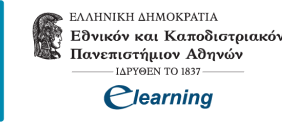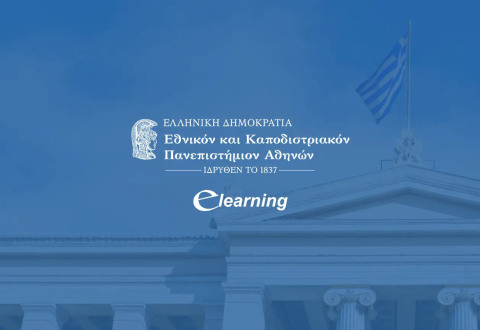National and Kapodistrian University of Athens announces the launch of a new Postgraduate Studies Program (PSP) for the academic year 2018-2019, which leads to the award of a Master's degree in “Nanomedicine”.
The purpose of this new PSP is to provide a high level post-graduate education in Nanomedicine.
The PSP leads to the award of a Master of Science (M.Sc.) in Nanomedicine after full and successful completion of studies based on the curriculum. The PSP accepts holders of a Bachelor's degree in the subjects of Medicine, Pharmacology, Biology, Physics, Chemistry, Engineering and other related ones.
The language of the PSP is English. The duration of the programme is one (1) year, including the time for the dissertation thesis and acknowledges 60 ECTS. The possibility of part-time study is provided. Students in this category must have a proven record of working and submitting a work contract or an employer certificate.
The curriculum of the PSP is divided in three Units of lectures and the dissertation.
The program of the lectures in presented in brief here:
UNIT 1: Introduction to Nanotechnology, Coordinator: E. P. Efstathopoulos
Lesson 1.1. Basic principles I
The wider context of Nanotechnology and Nanomedicine: What is nanotechnology and nanomedicine, definitions, why nanotechnology. History of nanotechnology, Applications of nanotechnology in Materials, Industry, Energy, Biotechnology, Medicine, Veterinary, Drugs, Agriculture & Food and Cosmetics.
The Fundamental Science of Nanotechnology: Materials and Devices Phenomena and material properties at nanoscale, with examples of Nanomaterials/Low-dimensional materials, top-down and bottom-up fabrication processes of nanomaterials, from nanomaterials to nanodevices (Examples of nanosensors in medical applications) and Lab visit.
Benefits and challenges of nanotechnology, Economic and social impact of nanotechnology
Lesson 1.2. Basic principles II
Main types of nanosystems: Dendrimers, Liposomes, Polymers, Magnetic nanoparticles, Carbon nanotubes and Graphenes, Metal nanoparticles and Quantum dots.
Nanostructured materials: Nanostractures classification, Current assumptions about nanostructures, Cellular interaction with nanoparticles, Potential cause of nanotoxicity.
Physiochemical characterization techniques of nanosystems: Scanning electron microscopy (SEM), Raman spectroscopy, Atomic force microscopy (AFM), X-ray diffraction (XRD), Transmission electron microscopy (TEM), Photon correlation spectroscopy.
Principles of Nanomedicine: What is nanomedicine, Nanomedicine applications, and Mechanisms of action – biodistribution, penetration, clearance.
Lesson 1.3. Basic principles III
Short overview of in-vivo imaging techniques: Basic principles of in-vivo imaging techniques: MRI, CT, US, SPECT and PET, Multimodality imaging, Imaging agents, Applications of nanoparticles in in-vivo imaging in Cancer imaging, Cardiovascular imaging, and Neuro-imaging.
Presentation of future perspectives and challenges for topics of Unit 1.
UNIT 2 : Applications of Nanotechnology in Medicine
Lesson 2.1. Basics of Nanomedicine
Enabling technologies for oral drug delivery, Introduction to pharmakocinetics (Absorption Distribution, Metabolism, Excretion), Introduction to Quality by Design I and II, Choosing the optimal enabling formulation for oral drug delivery, Biorelevant in vitro performance of orally administrated dosage forms, Modelling and simulation in drug development and approval, Solubility and solution properties of drugs, Drug stability and principles of Pharmaceutical Technology, Introduction to the lipidic structures and to the crystalline state of matter, Introductions to Polymers in Pharmaceutics, Introduction to modified release systems for drug delivery, Introduction to skin pathology and nanoparticulate’s penetration mechanism, Nanomolecular diagnostics and in vitro diagnostics, Biosensors, nanocrystals, quantum dots, magnetic nanoparticles II (applications), Imaging in interventional radiology, Searching the international literature.
Lesson 2.2 Basic applications of nanotechnology in therapy
Lipidic nanocarriers. Liposomes, chimeric lipidic nanoparticles and stimuli responsive, Nanogels and polymeric micelles, Clinical therapeutics and nanotechnology, Nanoparticulate formulations and skin diseases.
Introduction and applications to Theranostics, Applications of nanotechnology in: Radiation therapy, biophotonic therapy, vaccines, Surgery, interventional radiology. Nanobubbles.
Lesson 2.3 Theranostics and regenerative medicine
Applications of nanotechnology in Orthopaedics, Physical properties of stimuli responsive biomaterials, Smart biomaterials, Types of embryonic, fetal and adult stem cells, Application of smart biomaterials in regenerative medicine.
Presentation of future perspectives and challenges for topics of Unit 2.
UNIT 3: NANO-TOXICITY AND REGULATORY ASPECTS
Lesson 3.1. Toxicity aspects
Potential cause of nanotoxicity, Oxidative stress generation, Inflammation, Antioxidants, DNA damage
Interaction of nanoparticles: Cellular interaction with nanoparticles, Organs nanoparticles uptake, Adverse health effects.
Toxicity studies, In vitro and In vivo studies
Lesson 3.2. Current nanodrugs
Nanodrugs in clinical practice, Advanced nanoparticle systems, Nanotechnology-based advanced therapeutics, Nanotechnology for personalized disease management.
Lesson 3.3. Ethics and regulatory aspects
Nanomaterials and Manufacturing: framing the ethical issues. Toxicology and human health. Nanosimilars. Regulatory issues of nanomedicines (FDA, EMA).
Presentation of future perspectives and challenges for topics of Unit 3.
In the educational program committee are participating:
Efstathios P. Efstathopoulos, Professor of Medical Physics, Medical School, Chairman and as Costas Demetzos, Professor of Pharmaceutical Nanotechnology, Faculty of Pharmacy, as Deputy Chairman, and as members from the Medical School, Maria Gazouli, Associate Professor of Molecular Biology, and Olga Savidou, Associate Professor of Orthopaedics, and from the Faculty of Pharmacy Evagelos Karalis and Maria Vertzoni, Assistant Professors of Pharmaceutical Technology.
The application form can be found and dowloaded in the website of the Secretariat Postgraduate Studies department of the Medical School of Athens (http://school.med.uoa.gr/metaptyxiakes-spoydes/nea-programmata-metaptyxiakon-spoydon-apo-to-akad-etos-2018-19/diatmhmatika/nanoiatrikh.html) and in the website of the Department of Pharmacy (www.pharm.uoa.gr). Applications for student candidates can be sent electronically to stathise@med.uoa.gr or demetzos@pharm.uoa.gr from Monday 3rd September 2018, until Friday 21st September 2018. The selection process for candidates will be completed by Friday 28th September 2018 and the program will start by 15/10/2018.












